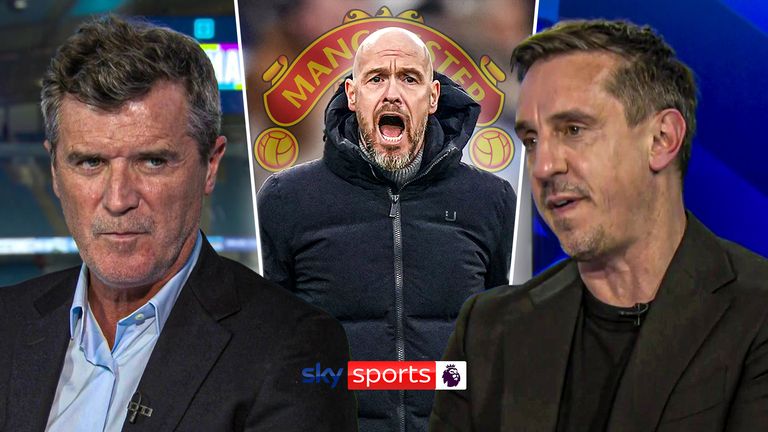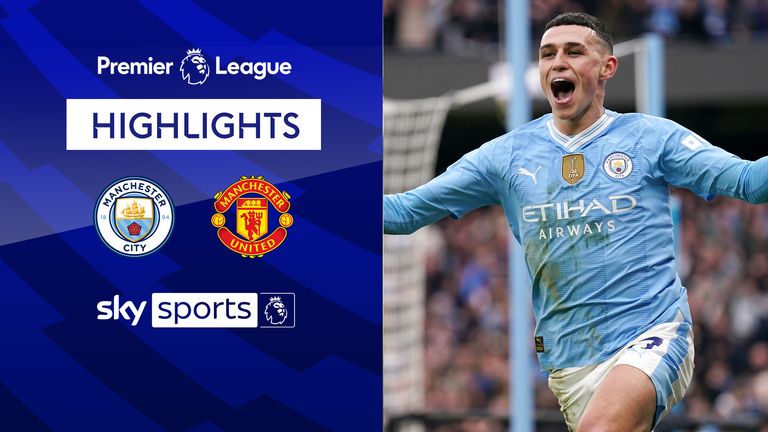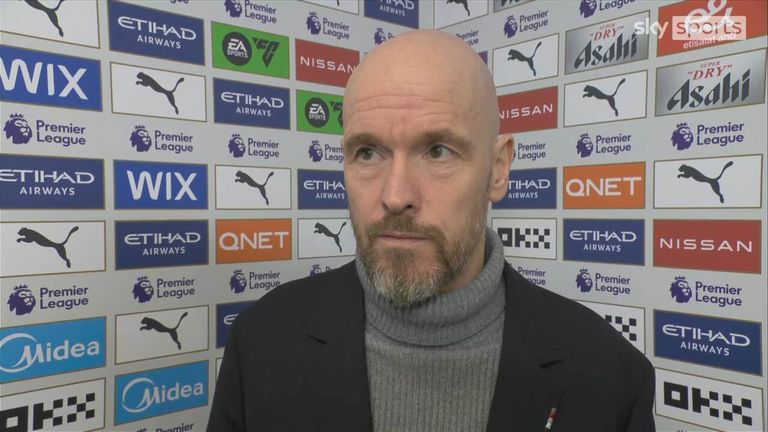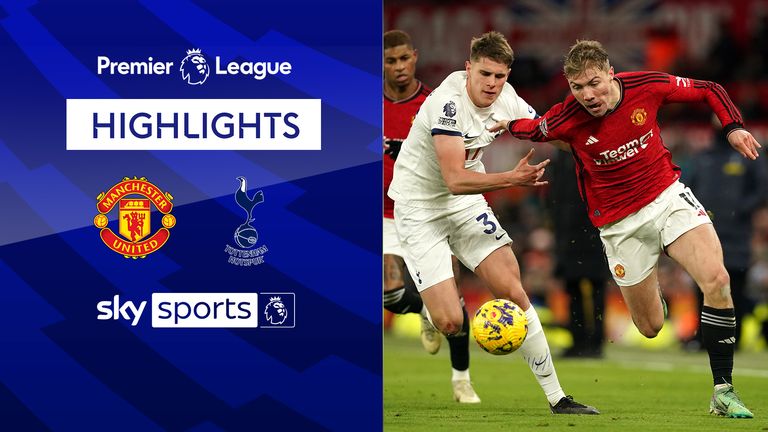Watching the team that Manchester United have become under Erik ten Hag, it brings to mind the optimism of his appointment. His success at Ajax was not just measured in silverware but the manner in which it was delivered through a distinct style of play.
Speaking to players and coaches who had worked with him in his native land, a picture was painted. “He always had the best tactical thoughts,” Boudewijn Pahlplatz told Sky Sports. “It has been step by step, developing his own philosophy and his own way of playing.”
Pahlplatz had been a team-mate. Sjoerd Overgoor was a player of Ten Hag’s at FC Twente and then Go Ahead Eagles. “Every time, we would start with the goalkeeper and he would talk us through the patterns of how we could attack,” Overgoor told Sky Sports.
There was no ambiguity to the approach. His style was stamped all over those sides. “After a couple of months of the season, there were matches where we knew what we had to do and everyone was seeing it the same way. It was really clear and it was working.”
This is all history but it feels pertinent given the nature of the criticism. Ten Hag has had to navigate stormy waters at Old Trafford. There is an appreciation that off-field events have disrupted his tenure. An understanding that the structures have failed him.
Where there is less sympathy for his struggles is on the pitch itself. Regardless of the errors in recruitment or any of the debate around man-management mistakes, it is the performances – even more than the results – that continue to undermine confidence in him.
“We need to see a style of play develop in the next few months,” Gary Neville told Sky Sports after January’s 2-2 draw with Tottenham. “What I see is a collection of single passes where a player receives it and has to work out where the next player is, rather than knowing where the next player is.”
The former United captain and influential pundit added: “Where is the default style of play in this team? I do not see it and that is a real concern. He has had 18 months and I do not think at this moment in time you can see those patterns developing.”
Into March, having embarked on a strangely unconvincing run of five consecutive wins in the meantime, those doubts have not gone away. Against neighbours and reigning champions Manchester City on Sunday, the contrast was stark, the evidence overwhelming.
Again, it was not the result. It was the fact that they arrived with most neutral observers anticipating that they would be played off the park. Their performance in this 3-1 defeat confirmed the worst. Manchester United are nowhere near the levels required.
Afterwards, Ten Hag sounded like a man in denial.
City’s dominance of possession was pointed out to him after United had only 27.1 per cent of the ball, the lowest that they had registered in a Premier League for seven years. “Football is not only about possession,” he replied. His team were not proactive, it was then suggested. “Proactive, you can also do it defending,” he argued.
When it was put to Ten Hag one final time that the game had demonstrated the gulf between the two sides, he said: “Absolutely not. We had many injuries and still we had an opportunity.” Any suggestion that City had simply outplayed United was rejected.
Some will agree with him so it is worth highlighting that the correlation between possession on the pitch and position in the table is clear. United rank ninth in the Premier League for possession at a shade over 50 per cent. The top teams do not play this way.
Nor can it be said to be working. United’s inability to prevent shots raining in on their goal is well documented but examine the difference between themselves and the teams above them in the table and it becomes obvious how far away they are.
Ten Hag’s team have now faced more than twice as many shots as City this season. Perhaps unsurprisingly, the four teams to have faced the fewest shots are currently the top four teams in the Premier League table. United’s football is unsustainable.
It was interesting to have the opportunity to put the style question to Ten Hag at the club’s training ground over Christmas. Some of his answers suggested that he needed more time. Others indicated that he was actively pursuing another idea anyway.
Ten Hag talked of “the DNA of this club” – a reference to the United tradition of fast-paced attacking play that made the more staid positional game of Louis van Gaal so unpalatable to some. There is a feeling that he has to work within certain parameters to succeed.
Not least because of the identity of the personnel. Marcus Rashford was inherited, Alejandro Garnacho has emerged. “It has to do with the nature of the players, definitely,” Ten Hag told Sky Sports. “With the speed of our attacking players we can play very direct.”
In that sense, maybe United appointed a pragmatist rather than a philosopher. He has stressed time and again that what worked at Ajax would not work in this job. At Utrecht, he did not play 4-3-3 at all, preferring to utilise the two good strikers that were available.
“He just adapts to the players that he has,” Bart Vriends of Go Ahead Eagles told Sky Sports. “We had wingers and played an attacking, dominant, passing game. At Utrecht, he changed to suit the players. He did not really stick to this Dutch style.”
The fear is that United are neither fish nor fowl as a result. They can play direct but do they really want to? Ten Hag talks of those high regains but is he really a coach for the counter-press? There is still a vague notion of turning United into a possession-based side.
Perhaps it is a mere plea for time but Ten Hag argued in that interview that his way will become clear once the injured players return. “I want to play from the back and if everyone is on board, you will see, we will do it. When we have the team ready, we will do it.”
The problem with this argument is that everything we know about modern management tells us that elite coaches put the style in place before bringing in the players. They might not win without world-class players but they do play their way. It all flows from that.
Jurgen Klopp arrived at an out-of-sorts Liverpool in October 2015 and was asked before his first game against Tottenham, what he expected to see after so little time working with his new players. “We want to look different,” he replied. “That is what I expect.”
Liverpool had to settle for a draw away to Tottenham but they ran further than in any game that season, making more sprints too. They became the first opponent to outrun Mauricio Pochettino’s Spurs that year. The principles were in place immediately.
Like Klopp, and unlike Ten Hag it is only fair to point out, Pep Guardiola failed to win a trophy in his first season as a Premier League manager. But he took a team ranked fifth for possession in the previous season to the highest possession total ever recorded in English football at that time.
Roberto De Zerbi’s Brighton had 70 per cent of the ball in three of his first seven Premier League matches in charge. Ange Postecoglou’s Tottenham put several seasons of turgid football behind them to play an expansive game right from the outset.
The patterns and the principles are recognisable regardless of the personnel. It is why Tottenham midfielder Pierre-Emile Hojbjerg could turn up at Old Trafford and complete more passes than Manchester United’s highly-regarded midfield trio put together.
It is why Brighton, shorn of their most valuable assets in the summer, were able to visit Manchester United and not only win the match but dominate the football. De Zerbi, remember, like Postecoglou, was appointed to his position more recently than Ten Hag.
There is a place for pragmatism in the Premier League. The fear is that this place is below the very best. Wolves boss Gary O’Neil has earned praise for adapting from game to game to make things more difficult for the opponent. Ten Hag cannot expect the same plaudits. This was poverty football with an £86m winger sat on the bench.
If Ten Hag is unable to bring sustained success, one wonders how he will one day reflect on what went wrong. It is likely that he would point, justifiably, to a myriad of factors beyond his control. And yet, there is one key reason why belief is beginning to ebb away.
The focus, the obligation, at Manchester United must be to establish a clear identity, a style that can provide that pathway to greater things. That this style is not obvious, even as other coaches arrive elsewhere and make a swift impact, is the biggest disappointment.



























+ There are no comments
Add yours